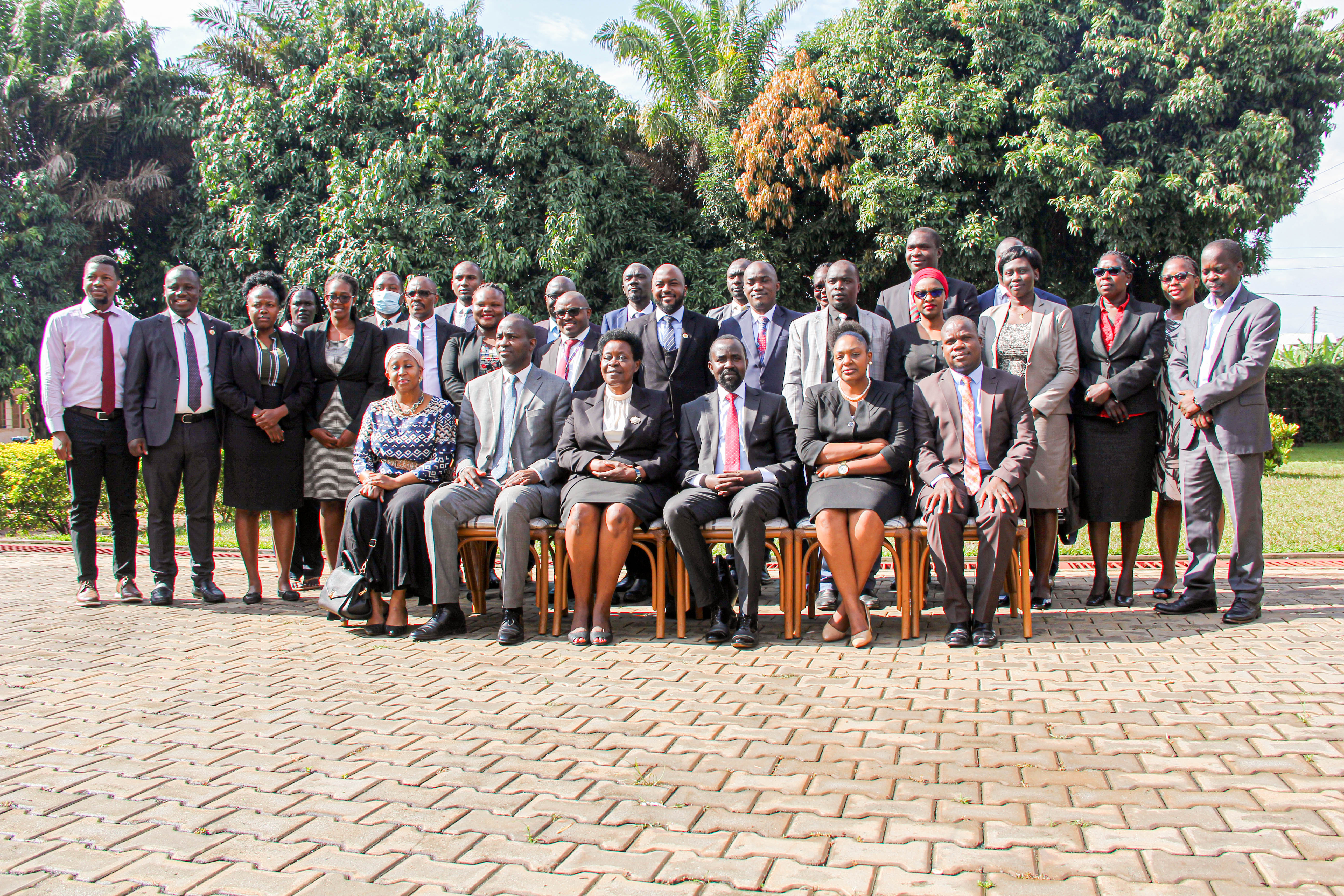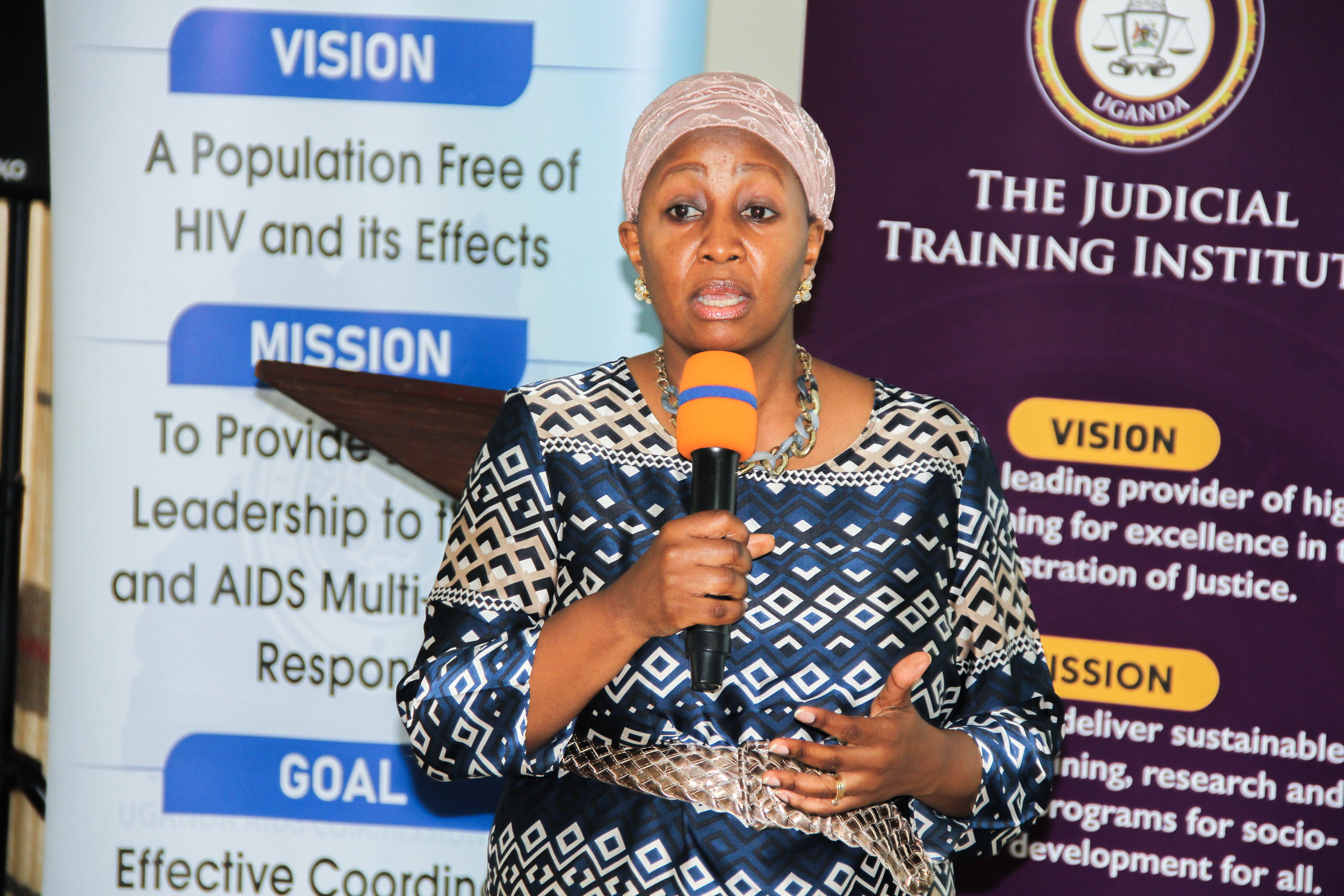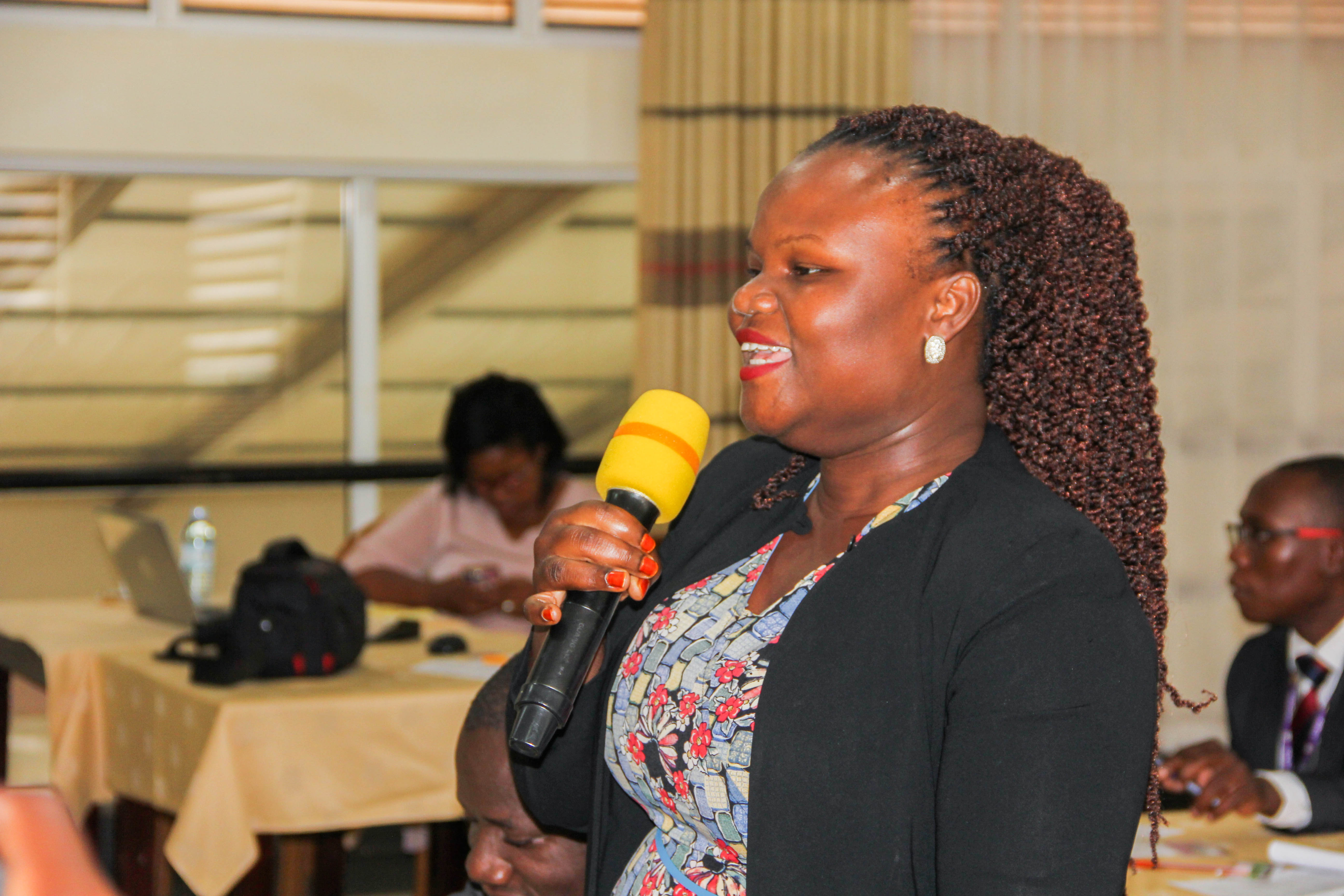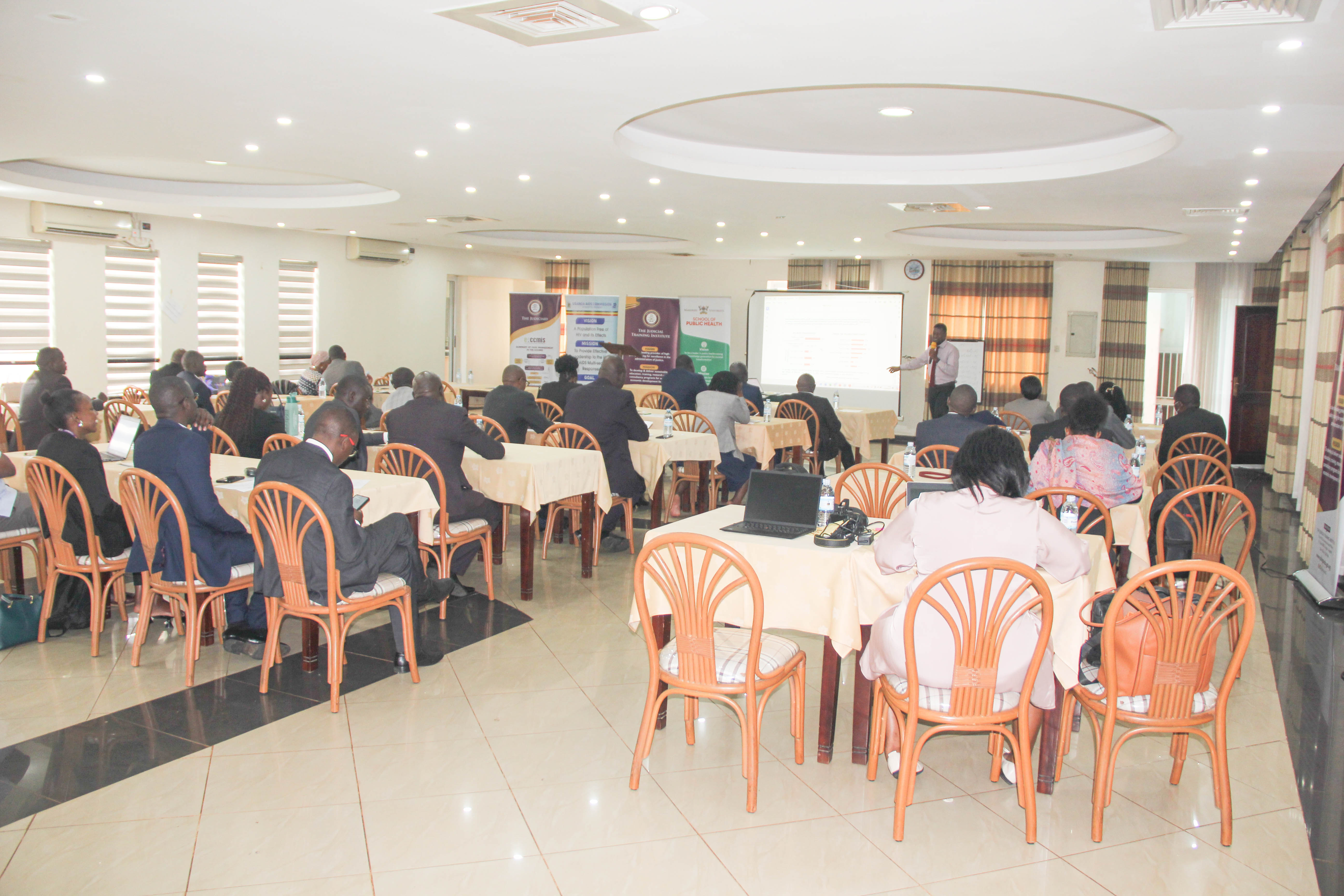
By Okeya John
In Uganda's persistent efforts to end the HIV scourge, the legal system stands at a pivotal crossroads—either as a powerful catalyst for change or a significant obstacle to progress.
Last month, Makerere University Schools of Public Health and Law, collaborating with the Uganda AIDS Commission and the Judicial Training Institute, organised a one-day capacity-building workshop for over 40 judicial officers from the North; comprising Judges, Registrars, Chief Magistrates, and Grade one Magistrates from Lango, Acholi, and West Nile Sub-regions.
The workshop, held under the theme: “Saying No to Stigma and Discrimination. Reshaping Mindsets in the Area of HIV/AIDS,” aimed at imparting knowledge to the judicial officers on rights-responsive legal enforcement for HIV and key populations in Uganda, with the view of confronting one of Uganda’s most uncomfortable truths in our country’s HIV response: the laws that are meant to protect society, often marginalises its most vulnerable members.
One such victims in Uganda are the key populations: a common phrase, globally used to mean people at higher risk of being affected by HIV. This group often faces social, legal, and structural barriers that increase their vulnerability to HIV transmission and infection. They among others include sex workers, people who inject drugs, prisoners and incarcerated people. In Uganda, this group numbers about 310,000, but accounts for over 25 per cent of new HIV infections per year.
They face heightened HIV risk due to marginalization and criminalization, severely limiting their access to essential services. Reports show that stigma remains a significant barrier, with many denied legal protection or healthcare because of social biases or punitive laws, particularly those criminalizing behaviors like sex work. This then creates a vicious cycle where these individuals remain vulnerable to HIV but are unable to access the prevention, treatment, or legal recourse needed to protect themselves, deepening their exposure to the virus.
Dr. Zahara Nampewo, the Deputy Principal of Makerere University School of Law, facilitating the capacity-building workshop for the judicial officers in Gulu emphasized that Uganda's ambitious plan to end HIV by 2030 requires judicial officers to adopt a rights-responsive legal approach to administering justice, stressing that the fight against HIV is not just for health scientists and social workers but demands the judiciary’s involvement as a critical player.

The rights-responsive approach calls for a justice system that prioritises the protection of human rights for all, particularly vulnerable groups like key populations. It has been known to guarantee that laws and policies uphold dignity and equality, offering fair treatment, access to justice, and protection from discrimination. The approach also addresses key challenges such as healthcare access and socio-economic barriers, ensuring that marginalised communities receive equal and equitable protection under the law.
Dr. Nampewo challenged the judicial officers during the training to combat HIV-related stigma and discrimination within the judicial system in the country, pointing out that biases often arise when cases involve individuals with HIV, hence impacting court outcomes. She urged the judicial officers to find themselves a role to play in the fight against HIV;
"Often, we hear that HIV is something for the health scientists—let them deal with it. And maybe social workers, to counsel people. So, as judicial officers, do we have a role to play? Because our government has committed to ending HIV by 2030, what is our role? Whenever you don’t see a role for yourselves, you become irrelevant. Create a role, find a niche, and see that you are also plugged into this fight against HIV. That is why we are here today—how do we, as people in the legal sector, plugin?” Dr. Nampewo asserted emphatically.
The workshop equipped the judicial officers with the knowledge and sensitivity needed to address cases compassionately while ensuring that the law does not further marginalize key populations. The judicial officers capacity building for the Northern Uganda cluster, comes as part of the recommendations of the 2022 Uganda Legal Environmental Assessment (LEA), a study conducted by MakSPH, the School of Law, the Uganda AIDS Commission (UAC), and the Centres for Disease Control – Uganda, together with the Ministry of Health, to examine how Uganda’s legal and policy framework impacts her national HIV response.
Today, Uganda has about 1.5 million people living with HIV and records over 38,000 new infections per year. The data indicates that key populations bear a significant share of the burden, contributing at least 25 per cent of the new infections, although their number remains significantly small at 310,000 individuals; comprising about 130,000 female sex workers, 7,500 people who inject drugs, and over 150,000 prisoners and incarcerated persons, etc... compared to the national population at 45 million people.

The legal environment study confirmed that the key populations in Uganda face significant barriers to accessing HIV and related services due to structural and legal challenges. Among them, social stigma and discrimination: at family, community, and healthcare levels were common, leading to limited access to justice when the group’s rights are violated. Law enforcement officers were also found to often lack understanding of the rights of key populations, leading to frequent human rights abuses. These violations range from denial of equality and health access to cases of inhumane treatment and privacy infringements.
The study report shows that while Uganda has laws to protect human rights, enforcement remains weak. It argues that several non-progressive laws, including the Penal Code Act, which criminalizes sex work and drug use, the HIV/AIDS Prevention and Control Act, which mandates HIV status disclosure and criminalizes transmission, the National Drug Policy and Narcotic Drugs and Psychotropic Substances Acts, which penalize drug possession and use, provide barriers that intensify the challenges faced by key populations in combating HIV.
“One message I want you to take is that a sensitized judiciary has a powerful role in increasing the national HIV response and its reduction,” Dr. Nampewo emphasized during the capacity-building workshop of judicial officers in Gulu, adding that: “I hope today, it’s not just the information you have acquired, but also some sensitivity, a shift in mindset, and a change in our perceptions toward persons living with HIV: always be mindful to assess how these individuals are treated within the justice system so that we minimize how they are disenfranchised. We must ensure that the law is not unfairly criminalizing them.”
Stark Reality: Escalating HIV Rates Among Sex Workers in Arua, Gulu, and Lira
Under the Crane Survey Project, Makerere University School of Public Health recently completed nationwide surveys in 2022, with the study focusing on sex workers aged 18-49 and sexually exploited children aged 15-17. During the judicial officers workshop for Northern Uganda, Dr. George Tumusinze presented the key findings for the districts of Arua, Gulu, and Lira, revealing the sobering reality of high HIV prevalence within these vulnerable groups.

The study estimates that there are at least 1,400 female sex workers and sexually exploited children in Arua, 5,300 in Gulu, and 760 in Lira, with socio-economic vulnerability being the main contributing factor. In Arua, 30 percent of these individuals were living with HIV, with prevalence increasing with age. In Gulu, this figure rose to 32 percent, and in Lira, it reached an alarming 42 percent. Equally striking are the pervasive rates of violence and stigma, severely impacting these vulnerable groups' access to healthcare and justice.
The survey revealed alarming rates of violence, with 38 percent of respondents in Arua reporting rape and 52 percent experiencing physical violence. In Gulu, 42 percent had been raped, with nearly half reporting beatings. In Lira, one-third had been raped, and 25 percent experienced rape in the past year. The survey found that 88 percent of sex workers in Arua experienced stigma, with over half denied healthcare due to their occupation. In Gulu, 79 percent reported stigma, and many avoided healthcare out of fear of judgment. In Lira, two-thirds faced stigma, and one in six was denied healthcare.
On the Agony of Accessing Justice for HIV Victims
Dr. Irene Namae, the Dokolo Court Magistrate and a participant in the training reecho Dr. Nampewo's resounding call for the Ugandan judiciary to take decisive steps to protect vulnerable populations as urgent, as she revealed that the community she serves just recently emerged from the sporadic Joseph Kony’s Lord’s Resistance Army insurgency in Northern Uganda, and to date, they still live with the trauma and wounds of the war.

“Dokolo has many people affected by the war. Some of them were raped during the insurgency of Kony and they have lived with this trauma to date and so, we wouldn't want to add more trauma by giving court sentences or orders that are very bad and that push the people to more traumatic situations, and that is why this training was timely,” Dr. Namae opined.
She said within the district, stigmatization of people with HIV is common, with victims avoiding court due to fear of discrimination, confirming that many people in her court fear how others, including their partners, will perceive them if they reveal their HIV status. She intimated that, unlike HIV-negative people who freely pursue their rights, the key populations always feel helpless and uncertain about whether they will receive fair treatment in court.
“People who are HIV-negative pursue their rights, speak freely, and often get what they want. But people who have HIV feel they are helpless when they come to court; not sure whether they will get justice; whether the Judge will appreciate their situation and administer that justice with a human face or with a human rights approach, given their peculiar circumstances of having that virus,” Dr. Namae shared, on the agony of HIV victims accessing justice.
Similar to the experience in Dokolo, His Worship Butoto Hassan Masaba, the Grade One Magistrate overseeing Amolatar District – a fishing community with high HIV prevalence: said that the HIV-positive individuals involved in the criminal justice system whom he interfaces with daily, much like the rest of Uganda, face unique challenges compared to other offenders, as their rights are often compromised, from detention to court appearances, with issues ranging from lack of access to medication and proper nutrition to inadequate legal support.
“So as a judicial officer, you have to find out how this person can quickly access the medicine and probably if it is in prisons you allow the Officer-in-Charge of Prisons to allow the medicine to come, or if they're in the same regimen, then they can be able to access it as soon as possible, even when they are in prison. What I normally tell people in my court is that all of us have been affected by HIV; by extension, either your relative, your mother, your father, or your in-law has been a victim. So, little did I know that I was already having that HIV lens.” He said.

Despite the challenges in accessing justice, Dokolo Court Magistrate, Dr. Irene Namae remains hopeful, assuring that: "This training will help me raise awareness so that even those affected by the virus understand that the court is here for them. We are trained, sensitive, and recognize that HIV impacts us all, not just them."
However, for this change to come into effect, as highlighted during the Gulu judicial officers workshop, the laws, policies, and institutional framework in Uganda must improve to aid the key populations access HIV services and justice. The Legal Environmental Assessment for Uganda’s HIV response is also alive to the fact that despite significant efforts by several actors in dispensing justice, key populations remain victims of human rights violations in their attempt to seek justice. The report notes that during arrests, they are often treated not as individuals with specific rights and identities, but rather as people with "bad habits."
The assessment states that laws that criminalize key populations reinforce stigma and discrimination and affect access to justice and health services; concluding that punitive laws contribute significantly to human rights-related barriers to HIV services, stigma, and discrimination of key populations, hence the need to review, amend, or repeal, and enact, implement, and enforce adequate protective laws in Uganda for increased access to justice for these vulnerable groups in the country’s national HIV response.
Globally, HIV remains a public health concern, with over 39.9 million people living with the virus as of the end of 2023. Among regions, Eastern and Southern Africa bear the brunt, accounting for 20.8 million cases—over 52 percent of the global disease burden. The region, where Uganda effectively falls, also posted the highest number of new infections globally, contributing at least 450,000 of the 1.3 million new infections recorded worldwide last year.
In 2018, the UN Global Commission on HIV and the Law reported that a legal environment that upholds and promotes human rights, alongside overall health and well-being, is critical to reducing the risks and impact of HIV. The Commission advocated for a joint goal for nation-states to promote a positive approach to key populations, aiming to end HIV/AIDS as a public health threat by 2030 through equitable access to justice, improving the legal environment for HIV response, and educating judicial officers on rights-responsive legal enforcement.


